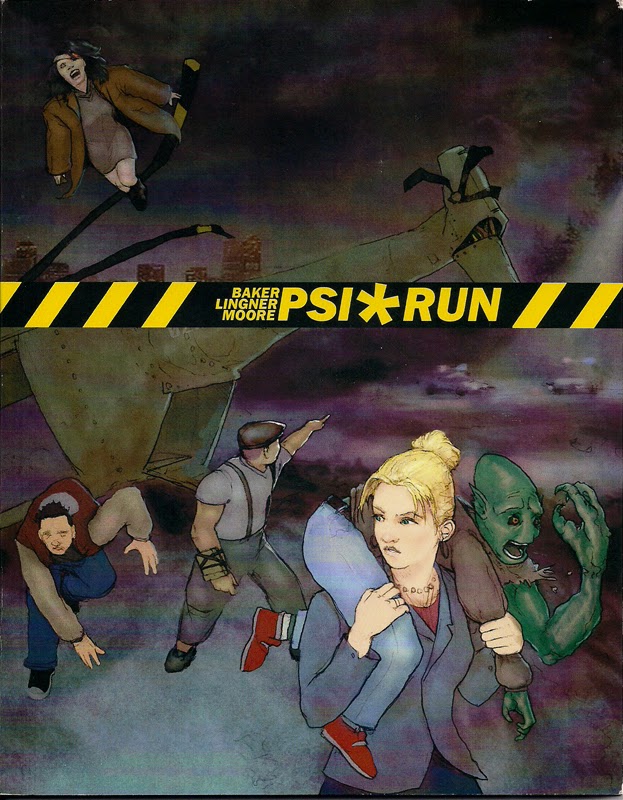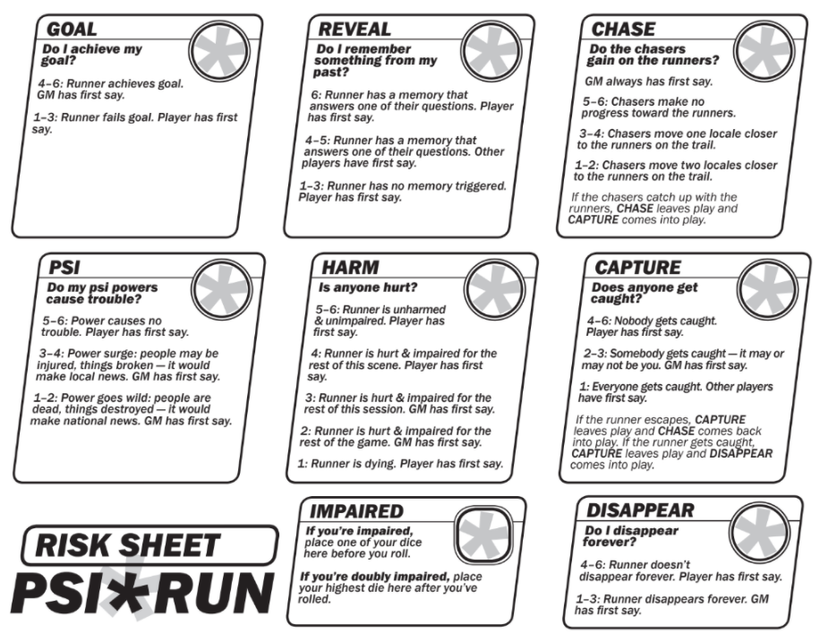Return of the Risk Sheet
I’ve got a lot here as I’m starting to catch up post cold and start of the semester.
Psi*Run Discussions 
Front cover of Psi*Run RPG.
Recently, the Dice Exploder podcast brought on John Harper to talk about a game mechanic. He chose the Risk Sheet from Psi*Run. Check it out: Dice Exploder with John Harper: Risk Sheet from Psi*Run. To buy a digital copy of the game: https://payhip.com/b/4VY9.

The Risk Sheet for the Psi*Run RPG.
The design for Psi*run has its origins in Otherkind Dice, https://lumpley.games/2022/03/14/otherkind-dice/?utm_source=substack&utm_medium=email
I personally got to try Psi*Run at Gamicon many, many years ago. It was being playtested by Chris Moore, and it was different from most RPGs I’d played. At this time, I was ignorant of the Forge scene, and I didn’t have many indie game connections.
It would be a handful of years later that I would design NetWhere, a layering of a specific sci-fi focused setting ideas about reality with a metacurrency, and help found Corridor Games on Demand in response, and Psi*Run was and sometimes still is a game we share with attendees at Gamicon.
NetWhere
https://aquavertigo.itch.io/netwhere
NetWhere is a role-playing game about virtual reality and self-discovery inspired and empowered by Meguey Baker’s Psi*Run game from Night Sky Games, http://www.nightskygames.com.
INTENTIONS: The point of NetWhere is that the characters are compelled internally to look for answers and then to do something interesting with the discovered info. Everyone in the group should strive to reincorporate the ideas of the game as well as to challenge the veracity of the Truth as they understand it.
NetWhere is designed as a multi-session game about Hackers searching for the Truth while avoiding capture by the Agents of Truth. Hackers are exceptional people who straddle the edge of reality between virtual worlds and whatever remains of the real world.
NightMirror
It was in the 2013–2014 years that I was still working on NetWhere when I read about the Gothic horror TV show Penny Dreadful. As soon as I watched the opening scene of the tarot cards being spread out by one of the protagonists, Vanessa, I knew I had to use Psi*Run and swap out tarot cards in place of dice. Everything flowed after watching the first season, and I was able to playtest the game at Forge Midwest soon after and then run a couple series of games and more playtests right up until COVID-19.
Here’s something I’ve used in the past to draw interest for the game.
I have dabbled with alternate presentation ideas for the game on my own between other projects. It’s not the easiest game to playtest online, even with more card-simulation tools available. I feel I’m waiting until gaming face-to-face more safely is an option. However, there is something in the back of my mind about providing a solo option through traditional tarot solitaire fortune-reading methods.
It’s a game that continues to whisper to me at times, and I hope to return to it once I deal with a couple other projects.
Star Wars, Genesys, and Narrative Dice

FFG Star Wars books, Genesys system book, and Star Wars dice.
On a different podcast, Third Floor Wars, I listened to an interesting interview with Jay Little, who was the designer behind the narrative dice and mechanics in RPGs for Fantasy Flight Games, including the Star Wars games of which I’m a fan.
What I’ve learned about FFG since the sale to Asmodee Games of the RPG line through Edge Studios is that, aside from the pandemic, much of the time is spent transferring everything over. The Star Wars line is not dead. There is support going on for other games through the Genesys system. Check out Edge Studios for current product listings.
I will admit that I too want to like the Genesys system and the dice more than I do. I’ve tried and read about numerous hacks to help make things flow easier at the table. There is a lot of “crunch” in the system, and so I have wondered if there will be official development or support for alternate versions of the core Genesys system. In my research, I discovered that Edge Studios has something in the works to support what it has called the Genesys Foundry. It’s a program to publish approved products with revenue sharing. There are no print-on-demand options at present.
So maybe there will be something for folks to use to make more of their own variations on Genesys.
Note: For those of you who don’t know, the dice are interesting in that the symbols are mapped to roleplaying parlance and when rolled you add positive dice to negative dice. The outcome of which provides some interesting outcomes to use in the fiction along with potential mechanical activations. For people like me, our brains don’t always work fast enough with the subtraction or interpretation. Also, you really do need to buy multiple packs of dice to have enough for a typical roll. The app works fine, but most players I know prefer to roll physical dice when gaming in person.
What Genesys games have you played, run, or created? What’s your experience with the rules and the dice?
Corridor Games on Demand
I brought games to our January game day: a game in playtest (not me), Dread, and Fall of Magic. I want to talk about two of the games here. We ultimately went with Dread.
The playtest game: A game designer with a game in playtest inspired by or modeled after the John Wick films caught my attention. I had never watched any of the films, but I was intrigued, so I got access to the game in ashcan format. I read through the game text. Like most ashcans, and this is not a knock on them, it seemed incomplete—that’s the nature of it, and it’s okay. What I felt was incomplete was knowledge about the source and subject matter, namely, John Wick films. So after I went through the document with notes, I felt I needed to watch at least the first film before I could reasonably offer to facilitate the game.
I watched John Wick 1. I have opinions about the film. It came out in 2014. I remember friends raving about it. I see memes about it all the time to this day after, I think, four films. I realized that I did not enjoy the film and that I may not enjoy the game based on that IP. I can see how the game works to emulate the skeleton of the film. I also feel that the game touches on things beyond the first film, and I know I’m not interested in watching more.
I did offer the game to the group without comment. I’m going to see if my friends who are gamers and who have professed to enjoying the film may be interested in playtesting the game. I do think that the game has the potential for more with additional development.
Dread RPG cover and a tumbling tower (core resolution mechanic)
Dread: The group chose Dread, and one of the participants in our game day loves, loves, loves the game and was willing to run it for the rest of us.
The GM, Tim, on short notice, created an idea for us and then asked us to answer some basic questions with the shared premise in mind: We were playing a horror RPG at a game convention at Miskatonic University when things went bad. In our game, there was something that began changing things into a fantasy setting. So people were turning into orcs and elves. Fake cosplay things changed into real versions.
At the core of it all was a spell or something that we could embrace or fight against. Embracing meant leaning into the fantasy world, which was mostly beneficial to survive but would erode a person’s identity and memories. It was an interesting exploration of tropes, and our party of five had two who leaned into the power of this effect, while one was on the fence, and two others resisted.
We barely managed to save the day for those who wanted things to return to normal.
Design, Playtesting, Rewards
Eye of the Magi is progressing. I’m reviewing the Approach/Engagement Forged in the Dark roll mechanic for the initial Mission contest, which is less about “winning leadership” and more about gaining insight or something interesting from researching or planning.
Found playtests have been hit or miss of late due to illnesses and other RL things. However, one thing that was an unexpected source of fun was the inclusion of love letters, a tool used by MCs in some PbtA games. I reviewed a number of examples and then created a love letter for each of the three PCs. I set a difficulty number, and the players rolled and consulted the options. It created some interesting conditions that are yet to be resolved. Our next session is scheduled for tomorrow.
Dark Well playtests have been going very nicely. Each session I test something and always come away with useful thoughts. The story is shaping up nicely and our next session this week will be a milestone session, ending the first arc. After that, our plan is to play in alternating weeks for about 4-5 more sessions. I have lots of material to process and write up and it’s exciting.
Space Station Omega, a 3-part mini-series, was a recent addition to my schedule. A longtime friend who lives states away expressed an interest in playing the game, so as a birthday present to him, I’m running a three-part game for him and two other players who I know through the Open Hearth Gaming Community. We had our first session last week and covered setup, the pregen player characters, and played through the opening of the scenario I’ve run before as a one-shot, The Promise of Peace. This was the first time the players have added shields to the station. Each PC seems to be operating on their own agenda and with each other, which I feel is where SSO should be most of the time to be successful.
Hearthwards is an RPG idea and Flames of the Rebellion is a RPG DRAFT I’m sharing with my $2+ patrons.
- Hearthwards is a magical realism comfort story game inspired by a combination of Howl’s Moving Castle and Jackie Chan’s Adventures through Leverage (Cortex Plus) and Forged in the Dark. Hearthwards are fantastical spaces that move through space based on the needs of fate. They go where they are most needed and build relationships with those they encounter. Some of those relationships last longer than others as staff members, while most happen as guests.
- Flames of the Rebellion is inspired by Star Wars: Andor + Mobile Frame Zero: Firebrands. It’s about intrigue, passion, and danger on the edge of space that could ignite the fight for freedom across a galaxy.
Next Steps
Continue on, especially with Eye of the Magi.
Feedback
Let me know what you think. Was this helpful or insightful?


